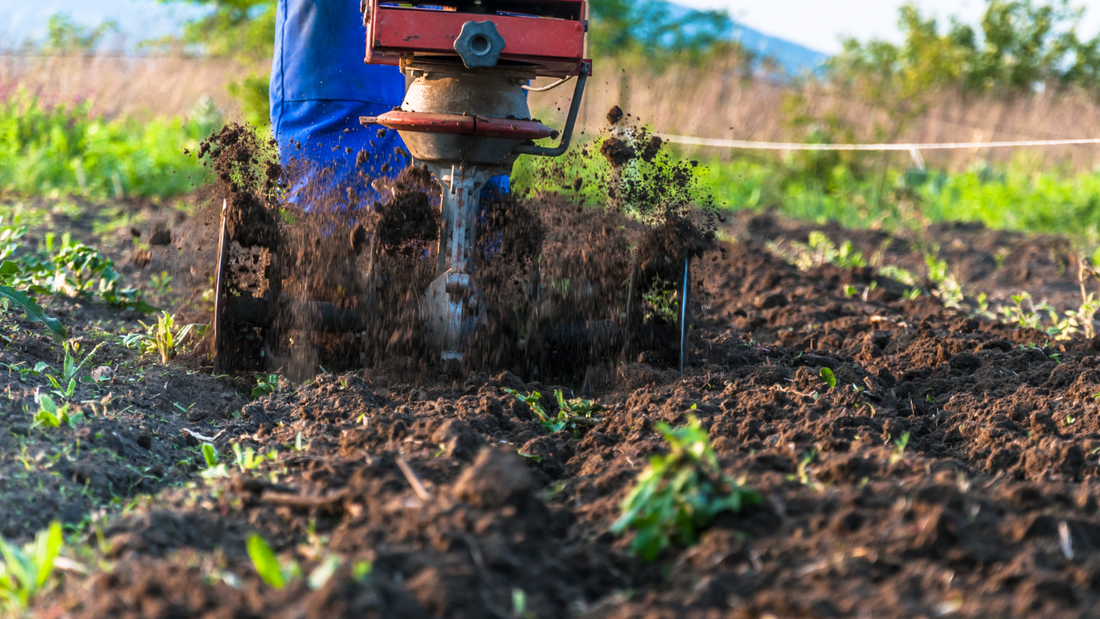Over the last decade or so, a lot of fuss has been made about the negative affects of tilling your backyard garden. "No-till gardening" seems more popular than ever as many backyard gardeners no longer yearn for the smell of freshly tilled soil.
We have three of our 30'x35' garden plots designated as "no-till" garden plots and have definitely seen some benefits of gardening this way. Below the soil surface, the soil biology is teeming with life and our plants in these plots do seem more resilient. But they're not bulletproof like some will suggest.
When Is Tilling Okay?
I think tilling has its place in certain situations. If you're starting a new garden plot in your lawn, you're probably going to need a tiller to get rid of the grass. If you just layer cardboard and mulch on top of grass around here, the grass will grow through it in no time. So at least initially, repeated tilling helps destroy those grass rhizomes and keep them from coming back.
Tilling can also be beneficial in southern climates where it doesn't get cold enough to kill fungal spores (and other soil-borne pests) in the winter months. Tilling can help disturb those fungal spores so they're not causing even more problems the following year.

Lastly, tilling brassica cover crops into the soil works wonders for nematodes and other soil-borne pests. We've been doing this natural biofumigation technique in our garden plots for years and are strong believers in the effectiveness of the process. We haven't had any root knot nematode issues in years, which is hard to believe down here where they are known to be bad.
But as is the case with anything in life, moderation is key. Tilling your soil too much can cause damage to the soil biology and the soil structure. Tilling excessively can turn your soil into a powdery dust that doesn't hold nutrients well and is void of beneficial biology. So while tilling can be helpful in some instances, you don't want to overdo it.
When Not To Till!
One of the biggest mistakes I see gardeners make is tilling right before planting. Yes, it seems ideal to plant in that freshly tilled, fluffy soil. But the downsides outweigh the upsides.
When you till, you're not only breaking up the soil. You're also stirring up the "weed seed bank." The weed seed bank is amount of weed seeds that you have in your soil. Everyone has weed seeds in their soil, it's just a matter of how many you have. The more weed seeds you have in your soil, the harder gardening is going to be.

Tilling brings those buried weed seeds to the surface where they can germinate and cause headaches for you all season. This is often why most gardeners throw in the towel once the summer months arrive. They get frustrated because they can't keep the weeds under control.
Instead of tilling right before planting, till your garden a couple weeks before planting. Allow that freshly tilled soil to receive some rain or overhead moisture via a sprinkler. The goal is to get those newly exposed weed seeds to germinate, so you can then kill them before planting.
You can kill them with a variety of techniques that don't require much soil disturbance. If your garden plot is small, you can simply use a hand hoe to lightly scuff the surface and kill those threadlike weeds. If your garden plot is larger, you may consider using a flame weeder or wheel hoe to kill the small weeds before they become big ones.

Think Before You Till
There's nothing wrong with tilling your garden a few times a year. You're not going to compromise the soil structure or soil biology at that frequency.
But think before you till. Think about what you're doing as far as exposing weed seeds that are just waiting for some rain and warm temperatures. And once they get those things, they'll explode and you'll be overwhelmed.
Plan ahead and till your garden a few weeks in advance of planting, and you'll be rewarded. You'll have time to eliminate the weeds that are born from the newly exposed weed seeds, and you'll find the garden is much more enjoyable in the summer months.

